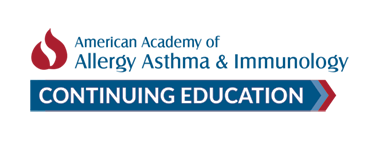Establishing and Operating an Air Sampling Station (Pre-Recorded)
Establishing and Operating an Air Sampling Station is part 3 of 5 that make up the 2021 Basic Aeroallergen Course. The Basic Aeroallergen Course includes instructions for operating volumetric air samplers, as well as an emphasis on microscopic features of pollen and fungal spores. The focus of the course will primarily be on concepts for the identification of common pollen and fungal aeroallergen sources encountered in the United States and abroad. Course participants will also receive training on how to set-up and operate a volumetric air sampler, process collected samples, and identify tree, grass and weed pollen, and fungal spores using light microscopy. Course participants will also learn how to become certified with the NAB.
Target Audience
The audience that participates in the Basic Aeroallergen Course includes prospective National Allergy Bureau (NAB) station heads and counters, clinicians, fellows in training, as well as those with a general interest in the field of Aerobiology.
Learning Objectives
Upon completion of this activity, participants should be able to:
- Describe the basics of setting up a sampling station and the use of air sampling in a clinical practice.
- Describe the fundamentals of plant and fungal reproductive biology as it relates to aeroallergens.
- Describe the basic features of pollen and fungal spore morphology and identify the most common pollen and fungal spores encountered in air samples.
Planning Committee
W. Elliott Horner, PhD LEED AP FAAAAI
UL Environment & Sustainability, Marietta, GA
Relevant relationships: None
Estelle Levetin, PhD FAAAAI
University of Tulsa, Tulsa, OK
Relevant relationships: None
Richard Weber, MD FAAAAI
Professor Emeritus, Denver, CO
Relevant relationships: None
Faculty
Estelle Levetin, PhD FAAAAI
University of Tulsa, Tulsa, OK
Relevant relationships: None
Content Reviewers
Leonard Bacharier, MD FAAAAI
Vanderbilt University, Nashville, TN
Relevant relationships: None
Joshua Boyce, MD FAAAAI
Brigham and Women's Hospital, Boston, MA
Relevant relationships: None
AAAAI Disclosure Policy
Pursuant to the Code of Ethics for the American Academy of Allergy, Asthma & Immunology (AAAAI) and the Standards for Commercial Support of Continuing Medical Education of the Accreditation Council for Continuing Medical Education, the AAAAI requires disclosure of certain information from faculty members of educational activities designated for CME credit by the AAAAI. Prior to the activity, authors and reviewers are required to disclose all relationships that meet the following parameters:
- Employment. Name of employer and job title.
- Financial interests. All organizations, other than the employer, from which the faculty member or a member of his/her immediate family or household receives annual remuneration in any amount (including grants, honoraria and consulting fees).
- Research interests. All organizations which support research projects for which the faculty member or member of his/her immediate family or household serves as an investigator.
- Legal Consultation Services/Expert Witness Testimony: All topics on which the faculty member provided legal consultation and/or expert witness testimony during the previous calendar year.
- Organizational interests: All organizations, other than the AAAAI, for which the faculty member holds volunteer positions.
- Gifts. All organizations from which the faculty member or a member of his/her immediate family or household have received a gift of any amount in the last year.
- Other interests. All interests of the faculty member or a member of his/her immediate family or household that would be judged by a majority of his/her peers to be more than casual and/or likely to impact his/her ability to exercise independent judgment. This includes any financial interest in or relationship with any manufacturer of a commercial product, and any financial interest or relationship with any organization that provides commercial support to AAAAI-sponsored educational activities.
The information disclosed by the speakers and planning committee was reviewed in accordance with the AAAAI Disclosure Policy. All potential conflicts of interest were resolved by the planners, faculty, and reviewers prior to their participation in the development of this activity.
Accreditation Statement
The American Academy of Allergy, Asthma and Immunology (AAAAI) is accredited by the Accreditation Council for Continuing Medical Education to provide continuing medical education for physicians.
Designation Statement
The American Academy of Allergy, Asthma & Immunology designates this activity for a maximum of 0.75 AMA PRA Category 1 Credits™. Physicians should claim only the credit commensurate with the extent of their participation in the activity. Credit claiming for the Interactive Education Institute will be available when the Reflection and Evaluation portion is complete.
Credit Claiming Period
Credit claiming for the live components of this activity will expire at 11:59 pm on December 31, 2021. Requests to claim credit on or after January 1, 2022 will be subject to an administrative fee.
Medium and Method of Physician Participation for a Live Activity, Online Course or Webinar Recording
Follow these steps to complete the activity:
- Register for the activity.
- Review the CME and Disclosure information.
- Attend the live webinars.
- Complete the activity evaluation.
Credit claiming will be available when the Evaluation portion is complete.
AAAAI Privacy Policy
To verify your participation in educational activities, you may be asked to provide your name, contact information, and/or other descriptors. The AAAAI will not release this information to outside entities. It may be used internally to inform you of other AAAAI educational activities. If you wish to have your information excluded from this process, please contact us at [email protected].
Questions
Registration and credit claiming questions should be directed to [email protected].
Available Credit
- 0.75 AttendanceAttendance credit.
- 0.75 CMECME credit.

 Facebook
Facebook X
X LinkedIn
LinkedIn Forward
Forward